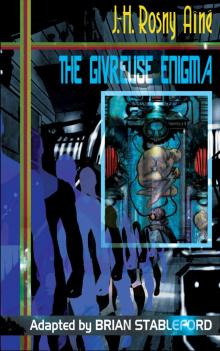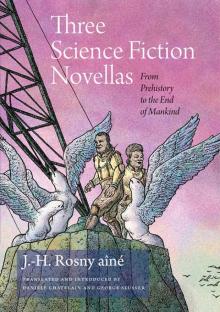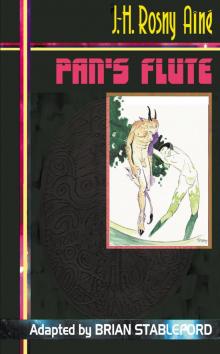- Home
- J. -H. Rosny aîné
The Givreuse Enigma Page 2
The Givreuse Enigma Read online
Page 2
“Everything’s natural!” said the doctor, impatiently. “Let’s go—we have to get them inside.”
There were only two free beds, one near the entrance and the other at the far end of the hut. The wounded men were undressed, without either of them emerging from their semi-lethargy.
“He’s also got a wounded tibia,” remarked the woman who resembled an oread. She was standing beside the one who had been installed near the door; she was washing his face gently.
At the back of the room, Major Herbelle was examining the second casualty. The skull fracture was quite serious. A bullet had broken the tibia, seven or eight centimeters below the knee. “This torpor,” Herbelle soliloquized, “doesn’t seem to be a consequence of the wounds. It’s true, though, that an explosion…the war will produce a great many nervous disorders…” He gave orders for the wounds to be bandaged, and headed for the other. “Nothing other than the skull fracture?” he asked.
“A bullet’s gone through the left tibia,” replied an aide.
“The left tibia!” cried Herbelle, in consternation.
“Yes, six or seven centimeters below the knee.”
“That’s impossible!”
“Why?” asked the young man, involuntarily.
“Because the other also has a tibia split by a bullet, and…” The major’s eyes expressed a sort of religious horror. Leaning over the soldier, he groaned: “It’s the same wound…the same…”
“Just like the skull,” sighed the nurse.
The man and the woman dared not look at one another. The prodigy was manifest. It filled Herbelle with repugnance and caused the tall nurse to bow her head.
“We’re dreaming!” whispered the doctor, his mouth marking his rebellion.
“We’re dealing with a higher reality!” affirmed the woman.
“If they would just wake up,” said the major, naively, “we could find out…”
“Their identity-papers!”
“Of course!”
Three minutes later, Herbelle held two sets of identity-papers, which resembled all military identity-papers, but which nevertheless filled the hearts of the woman and the two men with a kind of fear. They were absolutely identical. Each of them referred to Edouard-Henri-Pierre de Givreuse, born at Avranches on March 17, 1889. Each of them recorded a height of 1.74 meters, and advertized the nth company of the nth infantry division.
“It’s the same identification!” Herbelle concluded.
“But no authority would have consented to give two identical sets of identity-papers to different individuals!” observed the young man.
“Unless the authority was deceived, at least,” retorted the major, in a voice impregnated with a strange bitterness. He leafed through the papers feverishly, searching for some difference, but found none. On the contrary; a small ink-stain was identically reproduced in both documents. But what can it mean?” Herbelle moaned, putting his fists to his temples. “Of what supernatural trickery are we victims?”
“So you admit that it’s supernatural?” said the nurse.
“Oh! No, I don’t admit anything…I don’t know anything…I must be hypnotized.”
The young man scrutinized the documents in his turn. “The paper’s well-worn,” he murmured. “The sheets are scarcely holding together.”
“Ah!” exclaimed the major. “Does one appear to be older than the other?”
“My word, no. They’re equally fragile.”
“If they were false, at least—that would be a relief…”
“Aren’t there any men from the same regiment here?” asked the nurse.
“Not in this hut—but surely in one of the others…”
At that moment the wounded man opened his eyes. He looked at the people standing next to his bed in puzzlement, then voiced the plaint of all men in pain: “I’m thirsty!”
The nurse lifted his head and helped him to drink. He swallowed greedily at first, then with a weary slowness. Little by little his gaze cleared. “Am I wounded?” he asked.
The major and the nurse looked at him in bewilderment. “Yes you’re wounded.”
“Ah!” He seemed thoughtful. At intervals, his lips trembled and his eyelids fluttered slightly. Eventually, he whispered: “I remember…I fell in the forest…”
“On the heath!” the doctor corrected.
“The heath? No—in the forest, near the edge. We were beating a retreat. A shell-burst struck me in the head…but I carried on going…I think I dragged myself…and then…” A deep crease formed between his eyelids. “Then…let’s see… where did I get to? I don’t know any more…” His voice weakened; his eyes clouded over again.
“Your name is Pierre de Givreuse,” said the doctor, hastily. “You were born in Avranches in 1889?”
“That’s right. My name is Pierre de Givreuse.”
At the far end of the hut, the aide was making signs. “Do you have a brother?”
The pale face showed surprise. “A brother? Me?”
“Yes—a brother who looks like you.”
“I’m an only son.” He released a long sigh. His eyelids fluttered, then closed.
“It’s terrifying!” said Herbelle, passing his hand over his forehead.
“It’s not terrifying,” replied the nurse, making the sign of the cross. “It’s a higher reality…”
The major had just caught sight of the aide’s signs. He hurried to the far end of the hut. The other Givreuse still had his eyes open, but they were already misting over.
“Is your name Pierre de Givreuse?” exclaimed Herbelle.
The question appeared to revive the wounded man slightly. “Yes,” he replied, “Pierre de Givreuse.”
“Born in Avranches in 1889.”
“Yes.”
“Do you have a brother?”
The wounded man appeared to make a considerable effort to think; in a drowsy voice he muttered: “I have no brother…no brother!” His eyelids were closing.
“Try to remember!” Herbelle demanded—but Givreuse made no reply.
An hour later, Herbelle brought two slightly-wounded soldiers from the nth regiment to the bedside of the first Givreuse. “Do you know this man?” he asked.
“He’s only in my company!” one of the men replied. “He’s a pal—a good bloke. His name’s Givreuse.”
The major turned to the other soldier. “What about you?”
“No mistake, sir, that’s for sure. He’s not in my company, but I know him well—I’ve hung out with him.”
“But there’s another Givreuse in the same company?”
“Another?” exclaimed the first infantryman. “Well, he’s invisible then—I’ve never seen him.”
“Nor me!”
“You’ve never heard mention of a second Givreuse who resembles this one?”
“No, never.”
Herbelle shook his head sadly, then said: “Follow me.”
He led the men to the second Givreuse. “Look!”
They stood there open-mouthed. “You could knock me down with a feather!” muttered the man from the same company as Givreuse. “It’s the same man. A double!”
“A double!” repeated the other.
Herbelle said nothing.
The two soldiers murmured “Oh!” and “Well!” repeatedly; then the first declared; “It’s too much for me…but perhaps he’s in another regiment.”
Herbelle had them taken back to their hut. Something redoubtable had been added to the universe, and the doctor stood still for a long time, paralyzed by the dream, enveloped by a strange shadow in which there was a glimmer of the Abyss.
II.
They remained unconscious for 60 hours. They were transported to Gavres, to a hospital where their presence produced a strange emotion, which bordered on fear in a few of the women. For various reasons, Major Formental did not install them in the same room. Their case interested and shocked him. This was a duplicate man. In the magnificent and horrible mystery of life, he saw a definite en
d—death without aftermath—but he was nevertheless religious at heart. By contrast, the head nurse, Louise de Bréhannes, had an indomitable and immutable faith stripped bare of mysticism.
On the Tuesday morning, Louise de Bréhannes and Formental met up at the bedside of one of the two Givreuses. They had called him Givreuse I in order to distinguish him from the other, who had become Givreuse II. The soldier remained motionless, unconscious to human presence, voices and light. His sleep was profound; he was breathing regularly and effortlessly; the rhythmic movement of his breast was visible.
“Temperature 37.1,” said Louise de Bréhannes, “pulse 75.”
“I don’t understand,” said Formental, pensively. “Such an abnormal torpor shouldn’t be accompanied by so normal a state.”
“It’s simply a good sign,” affirmed Louise de Bréhannes. “The true cure of rest…” She wore an austere smile. A tall woman with flinty eyes, a jutting nose and shiny lips, she had a tyrannical manner.
Two young nurses were standing a short distance away. They were anxious. One of them murmured: “Long sleep often follows reincarnation…” Her name was Diane Montmaure; she was an occultist in whom shreds of evangelism persisted.
Formental heard her, and replied: “If Herbelle’s report is accurate—and the official documents support it—this is almost the opposite of a reincarnation…”
The occultist looked at the doctor. It was impossible to say exactly whether her hair was chestnut-colored or dark blonde; the play of light and shadow made the two shades alternate in their predominance.
Formental smiled wanly. “Thus far, the adventure surpasses both the classic supernatural and the classic natural.”
“What do you mean by the classic supernatural?” asked Louise, rudely.
“I mean all catalogued religious and mystical facts, Madame.”
Madame de Bréhannes started laughing silently. “What! On the contrary—the Menechmes… Sosie… We’re dealing with the most classical natural and supernatural…”4
“I don’t think so. Don’t forget that the two men don’t know one another at all, and that the soldiers of the nth regiment have only ever known one Givreuse—and yet, each of the Givreuses claims to have been born in Avranches in 1889, and their individual identity-papers are as identical as they are. Finally, that they have absolutely identical wounds.”
“Might not one be the other’s double?” suggested Diane Montmaure, timidly.
“A double is, by definition, a sort of shadow. Here we have two bodies of the same kind.”
“They’re both extremely light,” the other young woman put in. “The weight of a child!”
This remark made an impact on Formental. “They must be weighed,” said Louise de Bréhannes. Formental gave the order. The trolleys that transited wounded men to the operating theater came to fetch the two Givreuses. They were weighed.
“37 kilos 200…37 kilos 215 grams,” announced an aide named Charles.
“That’s practically the same weight…and that is indeed an abnormal density—half of the expected density,” said Formental feverishly. “Measure them, Charles.”
Charles went to fetch a horizontal apparatus of American design, on which the two wounded men were extended in turn. “Slightly less than 1.74 meters,” Charles pronounced.
Formental checked it carefully. “Yes, about two millimeters less. Let’s check the other…”
“Almost exactly 1.74 meters,” Charles soon replied. “A trifle more—one millimeter.”
“The identity-papers register 1.74 meters. The slightest difference of position would be enough to explain the difference. They definitely have the same stature and the same weight…abnormal. The logic of the mystery—the logic of the absurd—is confirmed. And they’re still asleep!”
“Because they haven’t entirely quit the other world,” murmured Diane Montmaure.
No one replied. Even Louise de Bréhannes was in a sort of trance, in which terrestrial life was fading into astral life.
III.
As the Sun was setting, Diane Montmaure was sitting by the bedside of Givreuse I. Mystical curiosity continually brought her back to it. She studied the wounded man’s untroubled face ardently, thinking about the incommensurable darkness that surrounded the stars and living beings. She was no longer astonished. Did not the simplest life far surpass the feeble imagination of men?
Suddenly, she shuddered to the depths of her being; two large jade-colored eyes were looking at her. Then a sleepy voice stammered: “I’m an only son.”
Bewildered, she asked: “Why are you telling me that?”
“Because someone asked me.” The eyes fixed themselves momentarily on Diane’s pale face, and then turned away. “Where’s the major? I’ve been moved to a different room.”
She leaned forward and replied, softly: “You’re no longer in the field-hospital.”
“I’ve been asleep, then?”
“You’ve been asleep.”
“For how long?”
She hesitated, but it was impossible to avoid the question. “Two days.”
“Two days!” he said, in alarm. “That’s terrible. Oh, I know…it was my wounds—I was hit in the head and…where else?”
“In the leg.”
“That’s right—in the leg. Is it dangerous?”
“Oh, not at all.”
“I’ll be able to write, then?”
“In a little while.”
“Just a few lines…to my mother…and…” He stopped short and looked at Diane. “You’re quite sure? Not dangerous?”
“That’s the doctor’s opinion.”
He paused. His face was still anxious, a trifle stiff and somewhat ghostly. “But that long sleep,” he remarked. “That’s bizarre. Why? I should be rested…but I’m tired, so very tired and weak!”
“That’s natural.”
“Natural? Perhaps. One might think, though, that something extraordinary has happened to me.”
“Why?” she asked, avidly.
“I don’t really know…it’s just an impression. Everything seems so far away…so far away! Oh, prodigiously!”
“So far away…in space?”
“I don’t know. It’s as if there were a limitless interval between the moment when I was wounded and now…”
For a moment, they were both plunged into a dream. “I’d like a drink,” he said, finally.
She gave him a drink. He drank avidly, but without voracity, then said: “Are we still winning?”
“We’re winning.”
He smiled, slowly and vaguely. “I thought the time had come and that France was going to die. What saved us? What force emerged from the depths? Or from the depths of men?”
His voice was weak, as if it were breaking up, but serious nevertheless, and possessed of an indefinable timbre, reminiscent of the sound of water falling into a distant abyss.
She could not help asking him: “You say that you’re an only son?”
“That’s right. I have no brother.”
“Nor cousins…born, as you were, in Avranches?”
“I only have female cousins—little girls. The oldest is 13. Why are you asking me that?” She blushed in confusion; he did not notice. “It’s just that the major, out there, asked me just as I was falling asleep…and it’s bizarre. What interest can he have had?”
“What if someone had been found on the battlefield who resembles you greatly?”
“And who can’t be identified?”
“Perhaps.”
At that moment Dr. Formental appeared on the threshold of the room.
In the next room, Louise de Bréhannes was by the bedside of the other Givreuse. He had just woken up. A red-haired nurse was giving him a drink. When he had drunk, the invalid looked at the two women anxiously. Then he asked: “Have I been asleep? It seems to me that I’m in a different bed.”
“You were at Viorne,” Louise de Bréhannes replied, in her beautifully harsh voice. “You were brought here w
hile you were asleep.”
“I’ve been asleep for a long time, then?”
“Two days and two nights.”
“Two days, Madame?”
“Two days.”
“That’s terrible. Why? Are my wounds serious?”
“No, you’ll be on your feet in a fortnight.”
“I’d like to inform my mother…”
“We’ll write to her.”
Like the other, the wounded man had an anxious expression, stiff and slightly ghostly. “I’m still very tired,” he said, “in spite of that long sleep...”
“You’ve lost a lot of blood.”
“There’s no other reason?”
“No, since your wounds aren’t dangerous.”
“Is it really only my wounds? I feel that something prodigious is going on…”
“Ah!” she said. A curiosity different from that of Diane Montmaure, but just as avid, caused her to ask: “What sort of thing?”
“My memories are confused, like a fog. One might think that it had been a long time…a very long time…” Madame de Bréhannes’ hard green eyes were fixed upon him. “I’m still thirsty,” he said.
When he had had a drink, he remained thoughtful for some while, then said: “Are we a long way from the front?”
“About 300 kilometers.”
“Are the Germans still retreating?”
“Yes.”
“What a miracle!”
“It’s God’s doing!” she affirmed.
He did not reply. His eyelashes fluttered. A profound uncertainty clouded his gaze.
Louise de Bréhannes could not contain her curiosity any longer. “You have a brother, I believe?”
“Someone already asked me that. No, I don’t have a brother.”
“Or a relative who resembles you?”
“None—I don’t have much family.”
In the next room, Formental sounded Givreuse’s chest with his stethoscope. He found no fever. The pulse was weak, the temperature normal. “Pure blood!” he muttered. The invalid’s weakness was evident, however. “Are you hungry?”
“A little.”
Formental was agitated. Amid the unleashing of ferocious forces, this incident acquired a mysteriously formidable significance. It was like a disdainful reply by the creative genius that quivers in the heart of things. He exchanged a glance with Diane Montmaure and, divining that she had already questioned the soldier, merely asked: “You’re not in pain?”

 Vamireh
Vamireh The Givreuse Enigma
The Givreuse Enigma Three Science Fiction Novellas: From Prehistory to the End of Mankind
Three Science Fiction Novellas: From Prehistory to the End of Mankind Helgvor of the Blue River
Helgvor of the Blue River The World of the Variants
The World of the Variants Pan's Flute
Pan's Flute The Navigators of Space
The Navigators of Space The Mysterious Force
The Mysterious Force